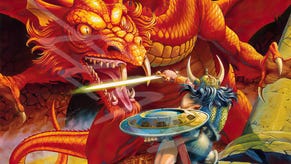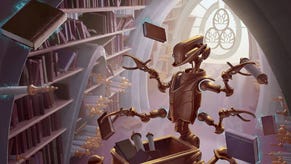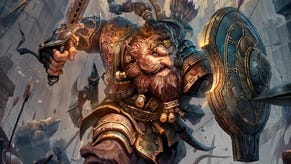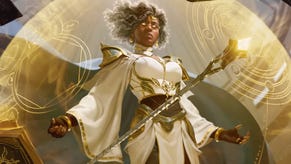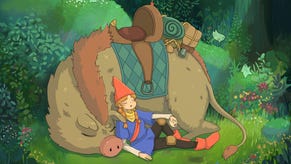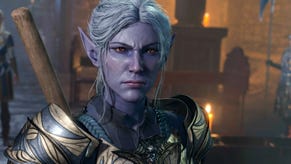“Playing at an all-trans POC table is a life-changing experience”: Transplanar creators on the importance of supporting diverse actual-play shows
“It’s crucial that we’re able to tell our stories.”
“In the states and elsewhere, being a trans person is really hard right now,” says dungeon master Connie Chang. “Having a show where every single cast member is trans and shows the euphoria of being trans is really valuable.”
Chang plans, writes and runs Transplanar, a Dungeons & Dragons actual play show that tells the story of a ragtag group of broken characters, all struggling against their own flaws so that they can reconnect the world of Eidolon to its missing gods. “It’s about a greater eldritch force threatening to plunge a fantasy realm into darkness,” explains Chang. “It’s largely drawing upon my own relationship with mental health.”
Every member of Transplanar, including Chang, is transgender, with the show’s entire cast of characters largely identifying as queer. The majority of Transplanar’s players and crew are also people of colour, with the show pitching itself to potential viewers as being a POC-lead, non-colonial and anti-orientalist series about Asian American Pacific Islander mythology.
Though the threat of darkness hangs over the world of Transplanar, Chang describes the danger as being “parallel to something like depression”, with the stakes of the story deriving from an outside force or the characters working through their own flaws, rather than anything connected to colonialist narratives or fears surrounding the characters’ queer identities.
I don’t run D&D combat rules as they’re written because I like to run it in a more accessible way.
“People think that for fantasy to be dark you have to include racism or sexual assault, you see this all the time in popular shows like Game of Thrones and Vikings,” they say. “My idea of fantasy involves cool monsters and mature themes that don’t hinge on oppression. […] Anything to do with queer identity is never a conflict point in Transplanar.”
While Transplanar is played using D&D 5E, Chang has found ways of making it an actual play show that avoids the tabletop roleplaying game’s built-in colonialist elements by including homebrewed aspects such as having players work together against an invasive force, rather than being the invading force themselves. “Standard D&D features story loops that revolve around going to ‘exotic lands’ to kill monsters and take their treasure - it feels very crusade-esque.”

Besides making the TRPG less colonialist and imperialist, Chang also alters the rules of D&D 5E to make it more straightforward for their players and audience to engage with: “I don’t run D&D combat rules as they’re written because I like to run it in a more accessible way.”
Queerness is built into every aspect of the world and is never questioned.
The DM uses a collection of safety tools when planning and running their games to ensure that players are never unpleasantly surprised by any story beats or made to feel uncomfortable. ”Safety is important to us, as this is not a comedy series. It deals with grief, trauma and tragedy,” they explain. “We have a master document for content warnings and have a rigorous decompression ritual.”
All of these aspects come together to form an actual play show that includes plenty of drama for the audience to grip onto, without ever disrespecting the identities of its characters and players. “Transplanar serves as a form of escapism,” Chang says. “Queerness is built into every aspect of the world and is never questioned. This is a place where being a trans, queer person of colour is never going to be something that puts you in active jeopardy.”
That Transplanar offers transgender people a “brave space” is important to everyone involved in the show. “One of my cast members said that cis people respect our pronouns but trans people understand our gender," Chang recalls. “If you’re a trans person of colour, playing at an all-trans POC table - that is literally a life-changing experience.”
The TTRPG actual play space will stagnate if those behind the wheel always come from the same background.
The cast members of Transplanar share Chang’s sentiments, with Dare – a Black non-binary writer – explaining that “the sense of comradery has provided such a peace of mind,” and queer agender Pakistani performer Hamnah describing Transplanar as being “like a breath of fresh air, it’s a place where people understand certain parts of me without me having to explain them”.
Playing on a table made up of entirely trans players not only enables the cast of Transplanar to feel more at ease, but also results in a show that features the kind of narratives you won’t find in an actual play series that isn’t trans-focused. Valiant, a Transplanar player who is bisexual and transmasc, believes “the show means being able to tell stories that wouldn’t otherwise see the light of day. […] It’s important that we tell our own stories, authentically from the heart.” To this point, Hamnah adds that “the TTRPG actual play space will stagnate if those behind the wheel always come from the same background”.

Though Transplanar has received plenty of support from its trans and POC audience, Chang expresses disappointment that cis white members of the tabletop actual play community haven’t been as actively supportive. “White people and cis people need to step up - consider this my call to action, if you’re a white person who cares about change and diversity.”
Unlike actual play giants like Critical Role and Dimension 20, Transplanar is one of many indie shows all vying for very similar audiences of people who enjoy watching or listening to tabletop RPG content. “I wouldn’t say that large shows necessarily provide competition to indie shows, but our productions don’t have the resources that the likes of Critical Role have,” Chang explains.
Companies such as Wizards of the Coast – which publishes Dungeons & Dragons – and Pathfinder studio Paizo have made positive steps towards improving representation and altering the aspects of popular TRPGs that continue to perpetuate colonialist, racist, heteronormative and cisnormative narratives. Chang references Wizards’ recent push towards removing set moral alignments for playable species. However, Chang believes that the real work towards making the tabletop RPG space better for minorities needs to be done within the community itself.
“As marginalised creators, we write ourselves into the narrative and the hobby, it’s work that’s always valuable,” they say. “But I wish it wasn’t our responsibility - though I don’t see it as a responsibility.”
The algorithms of TikTok, YouTube and Twitch primarily favouring cis and white actual play shows and TRPG content creators continue to make it harder for Transplanar to get in front of new viewers. “The algorithm of social media is designed to encourage outrage,” Chang says. “I've noticed a significant drop in engagement whenever we frame events as positive in the trans POC TRPG community.” The Transplanar DM believes that allies need to be more vocal and supportive of their and other trans and POC actual play shows, regardless of the context they’re being framed in.
Chang also highlights the fact that other actual play shows are continuing to fail in featuring diverse tables of players and game masters: “It’s 2022 and there’s no excuse for having an all-white table on an actual play anymore.” Much of the TRPG community is missing out on actual play shows that offer something unique in a place where POC and trans people feel understood and able to tell their own stories. Fans of tabletop RPGs would do well to give Transplanar a chance because, as Chang says, “the quality of the show is really hot!”




